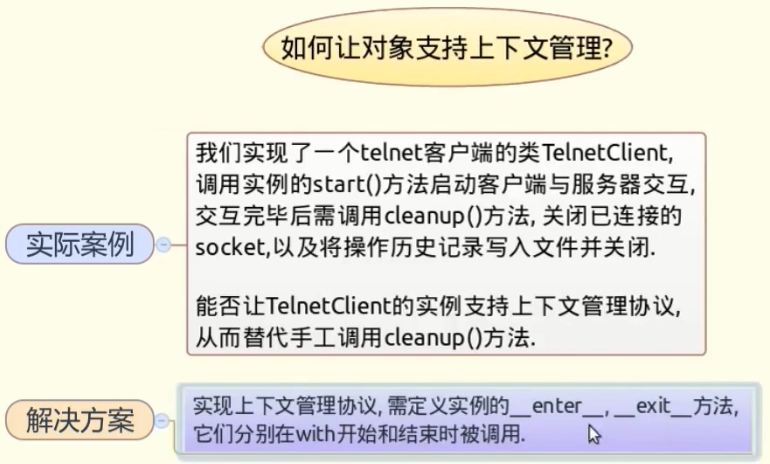
最先版本的
from telnetlib import Telnet
from sys import stdin, stdout
from collections import deque
class TelnetClient(object):
def __init__(self, addr, port=23):
self.addr = addr
self.port = port
self.tn = None
def start(self):
self.tn = Telnet(self.addr, self.port)
self.history = deque()
# user
t= self.tn.read_until('Login: ')
stdout.write(t)
user = stdin.readline()
self.tn.write(user)
# password
t= self.tn.read_until('password')
if t.startswith(user[:-1]): t = t[len(user)+1:]
stdout.write(t)
self.tn.write(stdin.readline())
t = self.tn.read_until('$ ')
stdout.write(t)
while True:
uinput = stdin.readline()
if not uinput:
break
self.history.append(uinput)
self.tn.write(uinput)
t = self.tn.read_until('$ ')
stdout.write(t[len(uinput)+1:])
def cleanup(self):
self.tn.close()
self.tn = None
with open(self.addr + '_history.txt','w')as f:
f.writelines(self.history)
client = TelnetClient('127.0.0.1')
print('
start....')
client.start() # 启动clinet方法
print('
cleanup')
client.cleanup() # 退出,清理内存
更新版本的
from telnetlib import Telnet
from sys import stdin, stdout
from collections import deque
class TelnetClient(object):
def __init__(self, addr, port=23):
self.addr = addr
self.port = port
self.tn = None
def start(self):
# self.tn = Telnet(self.addr, self.port)
# self.history = deque()
# user
t= self.tn.read_until('Login: ')
stdout.write(t)
user = stdin.readline()
self.tn.write(user)
# password
t= self.tn.read_until('password')
if t.startswith(user[:-1]): t = t[len(user)+1:]
stdout.write(t)
self.tn.write(stdin.readline())
t = self.tn.read_until('$ ')
stdout.write(t)
while True:
uinput = stdin.readline()
if not uinput:
break
self.history.append(uinput)
self.tn.write(uinput)
t = self.tn.read_until('$ ')
stdout.write(t[len(uinput)+1:])
def cleanup(self):
# self.tn.close()
# self.tn = None
# with open(self.addr + '_history.txt','w')as f:
# f.writelines(self.history)
pass
def __enter__(self):
self.tn = Telnet(self.addr, self.port)
self.history = deque()
return self
def __exit__(self, exc_type, exc_val, exc_tb):
self.tn.close()
self.tn = None
with open(self.addr + '_history.txt', 'w')as f:
f.writelines(self.history)
'''
client = TelnetClient('127.0.0.1')
print('
start....')
client.start()
print('
cleanup')
client.cleanup()
'''
with TelnetClient('127.0.0.1') as client:
client.start()
with 监控 enter 和 __exit__方法:
#_*_ encoding: utf-8 _*_ @author: ty hery 2019/12/20
打开文件对象
f = open('03.txt','wb')
# 2,向文件写入内容
try:
f.write(b'hello flask')
except Exception:
pass
finally:
# 3,关闭文件
f.close()
f = open('01.txt','wb') # 等同于下面的with open
# with是上下文管理器,内部的代码全部都在with的监管之下运行的
with open('03.txt','wb') as f: # 在f对象中含有__enter__,和__exit__方法,with调用这些方法
f.write(b'hello flask 01')
f.write(b'hello flask 02')
f.write(b'hello flask 03')
f.write(b'hello flask 04')
f.write(b'hello flask 05')
class Foo(object):
def __enter__(self):
'''进入with语句的时候被with调用'''
print('enter called')
def __exit__(self,exc_type,exc_val,exc_tb):
'''离开with语句的时候被with调用'''
print('exit called')
print('exc_type: %s' %exc_type)
print('exc_val: %s' %exc_val)
print('exc_tb: %s' %exc_tb)
with Foo() as foo:
print('hello python ')
a =1/0
print('hello end')
